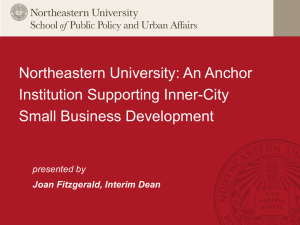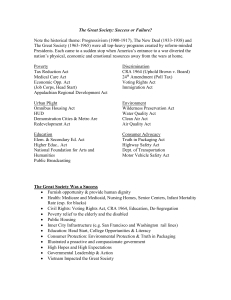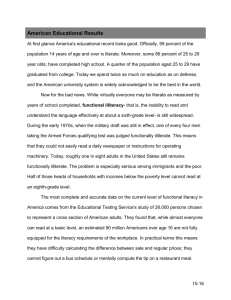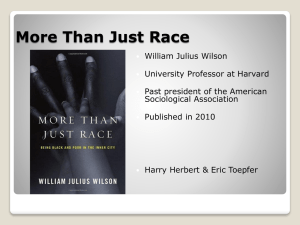urban and inner-city studies (uic)
advertisement
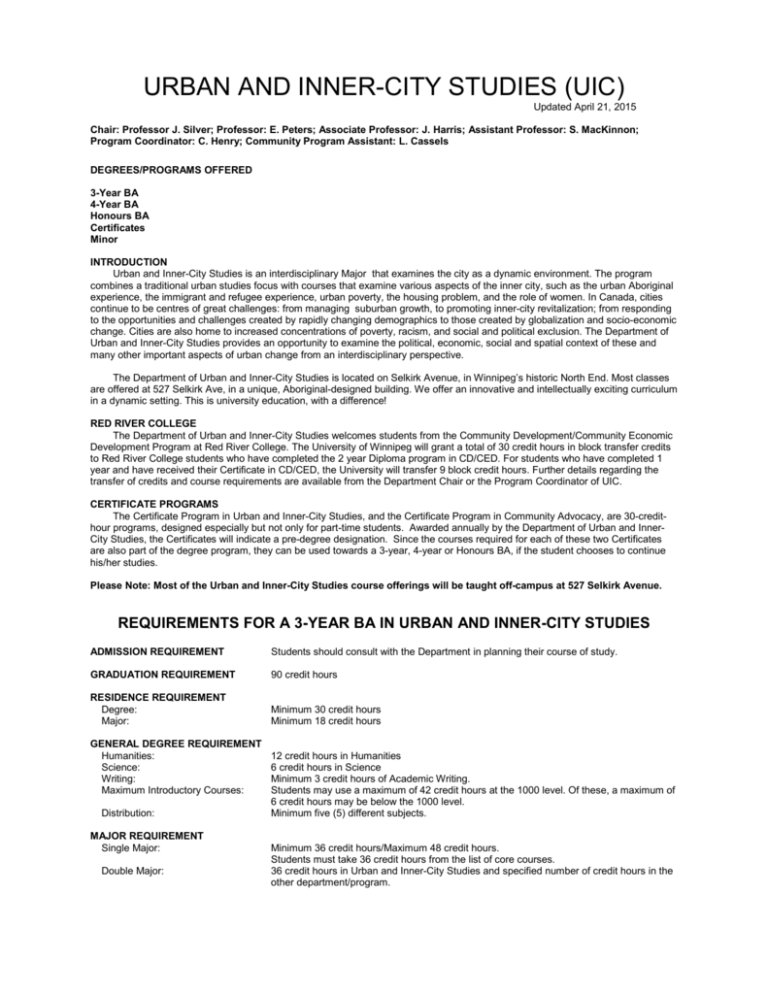
URBAN AND INNER-CITY STUDIES (UIC) Updated April 21, 2015 Chair: Professor J. Silver; Professor: E. Peters; Associate Professor: J. Harris; Assistant Professor: S. MacKinnon; Program Coordinator: C. Henry; Community Program Assistant: L. Cassels DEGREES/PROGRAMS OFFERED 3-Year BA 4-Year BA Honours BA Certificates Minor INTRODUCTION Urban and Inner-City Studies is an interdisciplinary Major that examines the city as a dynamic environment. The program combines a traditional urban studies focus with courses that examine various aspects of the inner city, such as the urban Aboriginal experience, the immigrant and refugee experience, urban poverty, the housing problem, and the role of women. In Canada, cities continue to be centres of great challenges: from managing suburban growth, to promoting inner-city revitalization; from responding to the opportunities and challenges created by rapidly changing demographics to those created by globalization and socio-economic change. Cities are also home to increased concentrations of poverty, racism, and social and political exclusion. The Department of Urban and Inner-City Studies provides an opportunity to examine the political, economic, social and spatial context of these and many other important aspects of urban change from an interdisciplinary perspective. The Department of Urban and Inner-City Studies is located on Selkirk Avenue, in Winnipeg’s historic North End. Most classes are offered at 527 Selkirk Ave, in a unique, Aboriginal-designed building. We offer an innovative and intellectually exciting curriculum in a dynamic setting. This is university education, with a difference! RED RIVER COLLEGE The Department of Urban and Inner-City Studies welcomes students from the Community Development/Community Economic Development Program at Red River College. The University of Winnipeg will grant a total of 30 credit hours in block transfer credits to Red River College students who have completed the 2 year Diploma program in CD/CED. For students who have completed 1 year and have received their Certificate in CD/CED, the University will transfer 9 block credit hours. Further details regarding the transfer of credits and course requirements are available from the Department Chair or the Program Coordinator of UIC. CERTIFICATE PROGRAMS The Certificate Program in Urban and Inner-City Studies, and the Certificate Program in Community Advocacy, are 30-credithour programs, designed especially but not only for part-time students. Awarded annually by the Department of Urban and InnerCity Studies, the Certificates will indicate a pre-degree designation. Since the courses required for each of these two Certificates are also part of the degree program, they can be used towards a 3-year, 4-year or Honours BA, if the student chooses to continue his/her studies. Please Note: Most of the Urban and Inner-City Studies course offerings will be taught off-campus at 527 Selkirk Avenue. REQUIREMENTS FOR A 3-YEAR BA IN URBAN AND INNER-CITY STUDIES ADMISSION REQUIREMENT Students should consult with the Department in planning their course of study. GRADUATION REQUIREMENT 90 credit hours RESIDENCE REQUIREMENT Degree: Major: Minimum 30 credit hours Minimum 18 credit hours GENERAL DEGREE REQUIREMENT Humanities: Science: Writing: Maximum Introductory Courses: Distribution: MAJOR REQUIREMENT Single Major: Double Major: 12 credit hours in Humanities 6 credit hours in Science Minimum 3 credit hours of Academic Writing. Students may use a maximum of 42 credit hours at the 1000 level. Of these, a maximum of 6 credit hours may be below the 1000 level. Minimum five (5) different subjects. Minimum 36 credit hours/Maximum 48 credit hours. Students must take 36 credit hours from the list of core courses. 36 credit hours in Urban and Inner-City Studies and specified number of credit hours in the other department/program. REQUIREMENTS FOR A 4-YEAR BA IN URBAN AND INNER-CITY STUDIES ADMISSION REQUIREMENT Students should consult with the Department in planning their studies GRADUATION REQUIREMENT RESIDENCE REQUIREMENT Degree: Major: GENERAL DEGREE REQUIREMENT Humanities: Science: Social Science: Writing: Maximum Introductory Courses: 120 credit hours Distribution: MAJOR REQUIREMENT Single Major: Double Major: Minimum 60 credit hours Minimum 30 credit hours 12 credit hours in Humanities 6 credit hours in Science 12 credit hours in Social Science Minimum 3 credit hours of Academic Writing. Students may use a maximum of 42 credit hours at the 1000 level. Of these, a maximum of 6 credit hours may be below the 1000 level. Minimum 3 credit hours from each of 5 different subjects. Minimum 51 credit hours/Maximum 66 credit hours. 51 credit hours in Urban and Inner-City Studies and specified number of credit hours in the other department/program. Required courses: 36 credit hours from the list of core courses 15 credit hours from the list of area courses Minimum 18 credit hours at the 2000 level Minimum 24 credit hours at the 3000 level Maximum 18 credit hours at the 4000 level Students who have obtained at least a 3.0 GPA in previous Urban and Inner-City Studies courses may substitute a maximum of 18 credit hours at the 4000 level for 3000-level courses. Students without the required 3.0 GPA must consult the Department for permission to take 4000-level courses. Combined Major: Minimum 60 credit hours from two different majors with not less than 24 credit hours from each major subject. REQUIREMENTS FOR AN HONOURS BA IN URBAN AND INNER-CITY STUDIES ADMISSION REQUIREMENT Students must have completed 30 credit hours with a minimum 3.0 GPA in Honours subject courses (cumulative GPA) and 2.5 GPA (degree GPA) in non-Honours courses. Students must consult with and have the approval of the Department in planning their course of study. GRADUATION REQUIREMENT 120 credit hours, with minimum 3.0 GPA in Honours subject courses and 2.5 GPA in NonHonours subject courses. RESIDENCE REQUIREMENT Degree: Honours: GENERAL DEGREE REQUIREMENT Humanities: Science: Writing: Maximum Introductory Courses: HONOURS REQUIREMENT Single Honours: Double Honours: Minimum 60 credit hours Minimum 30 credit hours, including minimum 18 credit hours at upper level (3000/4000) of which a minimum of 9 credit hours at 4000 level. 12 credit hours in Humanities 6 credit hours in Science Minimum 3 credit hours of Academic Writing. Students may use a maximum of 42 credit hours at the 1000 level. Of these, a maximum of 6 credit hours may be below the 1000 level. Minimum 54 credit hours/Maximum 78 credit hours Minimum 30 credit hours in 4000-level Honours Courses Students are allowed a maximum of 12 credit hours of Directed Readings toward the Honours requirement Minimum 36 credit hours in each Honours subject Minimum 24 credit hours in 4000-level Honours courses in Urban and Inner-City Studies Honours students must select from the course listings below according to the requirements under the 4 Year Degree: 36 credit hours from the list of core courses 15 credit hours from the list of area courses Honours students must include among their core and area courses: 30 credit hours at the 4000 level. REQUIREMENTS FOR A CERTIFICATE IN URBAN AND INNER-CITY STUDIES Students who take the following 30 credit hours of courses in the Urban and Inner-City Studies program are entitled to receive a Certificate in Urban and Inner-City Studies. Take the following six courses: UIC-1001(3) Introduction to Urban and Inner-City Studies DMISC-16476 0703 Introduction to University-eligible for transfer credit (3) or RHET-1105(3) Academic Writing UIC-2001(3) Community Development UIC-2020(3) Colonization and Aboriginal Peoples UIC-3001(6) Urban and Inner-City Practicum UIC-3020(3) Women and the Inner City Choose at least three of the following courses: UIC 1010(3) Indigenous Ways of Knowing UIC-2030(3) Management and Financial Administration for Community Leadership UIC-2210(3) Introduction to Community Advocacy UIC-2220(3) Urban Poverty and Policy UIC-2515(3) History of Education in Winnipeg’s Inner City UIC-3030(3) Urban and Community Planning UIC-3035(3) Human Resource Management for Community Leadership UIC-3050(3) Immigration and the Inner City UIC-3100(3) Issues in Urban and Inner-City Studies UIC-3210(3) Community Organizing UIC-3220(6) Community Advocacy Internship UIC-3240(3) Poverty and the Law UIC-3330(3) Solidarity and Social Economy in the City UIC-3430(3) Housing and the Neighbourhood REQUIREMENTS FOR A CERTIFICATE IN COMMUNITY ADVOCACY Students who take the following 24 credit hours of courses in the Urban and Inner-City Studies program, plus the 6 credit hours in Conflict Resolution Studies shown in Part B, are entitled to receive a Certificate in Community Advocacy. Part A: Take ALL 18 credit hours of the following UIC-2210(3) Introduction to Community Advocacy UIC-2220(3) Urban Poverty & Policy UIC-3040(3) Poverty and the Law UIC-3210(3) Community Organizing UIC- 3220(6)Community Advocacy Internship Part B: Take 6 credit hours from the following CRS-221(3) Restorative Justice CRS-2231(3) Nonviolent Social Change CRS-2421(3) Legal Systems and Alternative Dispute Resolution CRS-2431(3) Negotiation Theory and Practice Part C: Take 6 credit hours from the following UIC-2001(3) Community Development UIC-2020(3) Colonization and Aboriginal Peoples UIC-3020(3) Women & the Inner City UIC-3030(3) Urban & Community Planning UIC-3050(3) Immigration & the Inner City UIC-3100(3) Issues in Urban & Inner-City Studies UIC-3430(3) Housing & the Neighbourhood REQUIREMENTS FOR A MINOR IN URBAN AND INNER-CITY STUDIES Degree: Students completing any undergraduate degree program are eligible to complete the Minor. Minor: 18 credit hours in the Minor subject, with a minimum of 12 credit hours above the 1000-level Residence Requirement: Minimum 12 credit hours in the Minor subject Required courses: UIC 1001(3) Introduction to Urban and Inner-City Studies Minimum 3 credit hours at 3000 or 4000 level Restrictions: Students cannot declare the same subject as a Major and a Minor. COURSE LISTINGS Please note: Courses with asterisks (*) have prerequisites or require departmental approval. All 4000 level honours courses require permission from the appropriate department and some may have prerequisites. Core Courses: All students must complete a minimum of 36 credit hours from the core list. Take the following six courses: UIC-1001(3) Introduction to Urban and Inner-City Studies ECON-1104(3) Introduction to Economic Theory or ECON-1106(3) Economics of Development UIC-2001(3) Community Development UIC-2020(3) Colonization and Aboriginal Peoples UIC-3001(6) Urban and Inner City Practicum* UIC-3030(3) Urban and Community Planning Choose at least five of the following: UIC-1010(3) Indigenous Ways of Knowing UIC-2030(3) Management and Financial Administration for Community Leadership UIC-2210(3) Introduction to Community Advocacy UIC-2220(3) Urban Poverty and Policy UIC-2515(3) History of Education in the Inner City UIC 3002 (3)/(6) Directed Readings UIC-3020(3) Women and the Inner City UIC-3035(3) Human Resource Management for Community Leadership UIC-3050(3) Immigration and the Inner City UIC-3100(3) Issues in Urban and Inner-City Studies UIC-3210(3) Community Organizing UIC-3220(3) Community Advocacy Internship UIC-3240(3) Poverty and the Law UIC-3330(3) Solidarity and Social Economy in the City UIC-3430(3) Housing and the Neighbourhood UIC-4001(3)/(6) Directed Readings in Urban and Inner-City Studies UIC-4010(3) Urban Poverty UIC-4020 (3) Inner-City Workshop UIC-4210(3) New Urban Worlds UIC-4445(3) Urban Aboriginal Seminar Area Courses: Four-year Majors and Honours students must complete a minimum of 15 credit hours from the area list: Anthropology ANTH-2160(3) Indigenous Peoples and the Industrial State* ANTH-2211(3) Origins and Development of Urbanism ANTH-4105(6) Aboriginals and Newcomers in Encounter: Selected Topics Business and Administration BUS-3250(3) Not-for-Profit Management * Conflict Resolution Studies CRS-2443(3) Conflict and Development Issues in Indigenous Communities CRS-3242(3) Women and Peacemaking CRS-4910(3) Conflict and Construction of the Other Criminal Justice CJ-4105(3) Seminar in Youth and Justice English ENGL-3717(6) Aboriginal Literatures* Environmental Studies ENV-3025(3) Issues in Sustainable Cities* ENV-3603(3) Winnipeg and the Environment* Geography GEOG-2414(3) GEOG-3413(3) GEOG-3010(3) GEOG- 4403(3) Processes GEOG-4404(3) History HIST-2509(6) HIST-3121(3) HIST-3542(6) HIST-3544(6) HIST-3545(6) HIST-4570(3) The Urban Environment* Urban Revitalization* Urban Studies Special Topics Urban Land Use Developmental Field Research in Urban Geography History of Aboriginal Peoples of Canada Women in the Modern World Gender, Class and Ethnicity in Canadian History History of Winnipeg Historical Perspectives on Women in Canada Aboriginals and Newcomers in Encounter: Selected Topics International Development Studies IDS-2110(3) Participatory Local Development (formerly IDS-3110(3)) IDS-2160(3) Indigenous Peoples and the Industrial State* IDS-2443(3) Conflict and Development Issues in Indigenous Communities IDS-4920(3) Program Planning, Monitoring, and Evaluation Indigenous Studies IS-1015(6) Introduction to Indigenous Studies IS-4021(6) Pathways to Indigenous Wisdom IS-4022(3) Indigenous Research Methods Political Science POL-2405(6) Women, Gender and Politics POL-2410(6) Human Rights and Civil Liberties in Canada POL-2500(3) City Politics POL-2505(3) Issues in City Politics POL-3020(3) The New Segregation: Poverty, Race and Social Exclusion POL-3400(3) Aboriginal Politics in Canada POL-3405(3) Aboriginal Politics in Manitoba POL-3411(3) Aboriginal People and the Law POL-3415(3) Aboriginal People and the Law II POL-3510(3) Interest Groups and New Social Movements POL-4440(6) Seminar in Aboriginal Politics POL-4505(6) Politics of Urban Planning POL-4515(6) Inner-City Seminar POL-4520(3) Theories of Urban Poverty Religion and Culture REL-2801(3) Introduction to Aboriginal Spirituality I REL-2802(3) Aboriginal and Christian Encounters REL-2804(3) Global Perspectives on Aboriginal Societies, Spirituality and the Environment REL-4551(3) Religion and Social Change REL-4800(3) Topics in Aboriginal Religious Traditions Sociology SOC-2105(6) SOC-2118(6) SOC-2120(3) SOC-3113(6) SOC-3123(3) SOC-3208(3) SOC-4412(6) SOC-4413(6) SOC-4414(6) Race, Ethnic and Aboriginal Relations* Sex and Gender Relationships* Sociology of Communities* Sociology of Cities and Urban Life* Crime, Victimization and Justice in Aboriginal Communities* Women: Crime and Social Justice* Seminar in Sociology and the Family Seminar in Race and Ethnic Relations Seminar in Women in Society Urban and Inner-City Studies UIC 3011(3) Inner-City Economic Development Writing, Rhetoric and Communication RHET-3321(3) Composing Our Winnipeg: Rhetoric and/of the City Women's and Gender Studies WGS-1232(6) Introduction to Women and Gender Studies WGS-2250(3) Women of Colour in Canada* WGS-3242(3) Women and Peacemaking* WGS-4004(3) Feminist Cultural Studies Honours Course List: Note: All honours level courses require permission of the appropriate department and some may have prerequisites. UIC 4001(3)(6) Directed Readings in Urban and Inner-City Studies UIC 4010 (3) Urban Poverty UIC-4020(3) Inner-City Workshop UIC-4210(3) New Urban Worlds UIC 4445(3) Urban Aboriginal Seminar IS 4021(6) Pathways to Indigenous Wisdom IS 4022(3) Indigenous Research Methods CJ 4105(3) Seminar in Youth and Justice HIST 4570/ Aboriginals and Newcomers in Encounter: Selected Topics ANTH 4105 (6) CRS/IDS 4910(3) Conflict and Construction of the Other GEOG 4403(3) Urban Land Use Developmental Processes GEOG 4404(3) Field Research in Urban Geography HIST 4570(3) Aboriginals and Newcomers in Encounter: Selected Topics IDS/CRS 4920(3) Program Planning, Monitoring, and Evaluation POL 4440(6) Seminar in Aboriginal Politics POL 4505(6) Politics of Urban Planning POL 4515(6) Inner-City Seminar REL 4551(3) Religion and Social Change REL 4800(3) Topics in Aboriginal Religious Traditions SOC 4412(6) Seminar in Sociology and the Family SOC 4413(6) Seminar in Race and Ethnic Relations SOC 4414(6) Seminar in Women in Society WGS 4004(3) Feminist Cultural Studies Please note: Courses with asterisks ( * ) have prerequisites or require departmental approval. The following is an example of a possible degree program. Students are strongly encouraged to see a UIC program academic advisor when planning their individual programs. A liberal arts education is a well-rounded education that promotes a broad understanding of the world while developing communication and critical thinking skills which are applicable to many different career paths. Given the range of options available, no two students will graduate with the same selection of courses. Year 1: UIC-1001(3) Introduction to Urban and Inner-City Studies UIC-2020(3) Colonization and Aboriginal Peoples 3 credit hours of Academic Writing Requirement 6 credit hours of Humanities 15 credit hours of electives Year 2: ECON-1104(3) Introduction to Economic Theory UIC-2001(3) Community Development UIC-2220(3) Urban Poverty and Policy UIC-3020(3) Women and the Inner City UIC-3210(3) Community Organizing 6 credit hours of Humanities 6 credit hours of Science Requirement 3 credit hours of electives Year 3: UIC-3001(6) Urban and Inner-City Practicum UIC 3030(3) Urban and Community Planning UIC-3040(3) Poverty and the Law UIC-3050(3) Immigration and the Inner City UIC-3 3430 (3) Housing and the Neighbourhood 12 credit hours of electives COURSE DESCRIPTIONS UIC-1001(3) INTRODUCTION TO URBAN AND INNER-CITY STUDIES (Le3) The course provides an overview of the dynamics that drive a city’s growth and that produce change over time. It considers the social impact of urban change, with particular emphasis on the interconnectedness of the different parts of the city and on the impact of urban change on the inner city. It examines how these changes shape city politics, looking at the political interests and problems associated with the commercial core, older residential neighborhoods near the centre, and burgeoning suburban and exurban areas. It also examines how the three levels of government are involved in shaping and responding to these changes. UIC-1010(3) INDIGENOUS WAYS OF KNOWING (S3) Large numbers of Indigenous peoples settling in Winnipeg, and in core neighbourhoods, suggest that students studying urbanism need to be aware that the city and critical issues in the inner city can be interpreted differently. This course offers an introduction to Indigenous ways of knowing through active participation in strategies that facilitate the production of Aboriginal knowledge and through comparisons with EuroAmerican ways of knowing. By taking part in basic ceremonies and related practices, students gain an understanding of how First Peoples of Manitoba relate to each other, to the land, to other animals, and to the world. CROSS-LISTED: IS-1010(3) UIC-2001(3) COMMUNITY DEVELOPMENT (Le3) This course is an introduction to the idea of community development and community economic development. The course considers the principles and philosophy of community development/community economic development, and examines the key elements of CD/CED including neighborhood revitalization; housing development and rehabilitation; employment development and training; and social enterprise. CROSS-LISTED: IS-2301(3). UIC-2020(3) COLONIZATION AND ABORIGINAL PEOPLES (Le3) This course examines the Aboriginal colonial experience, particularly in Western Canada, and the impact colonization has had and continues to have on the relationship between Aboriginal peoples and Canadian governments. This course emphasizes the contemporary effects of colonization, particularly as regards identity issues and how they play out in the urban and inner-city environment, and also processes and strategies for decolonization. CROSS-LISTED: POL-2020(3) and IS-2020(3). UIC-2030(3) MANAGEMENT AND FINANCIAL ADMINISTRATION FOR COMMUNITY LEADERSHIP (Le3) As small-scale and not-for-profit structures, community-based and aboriginal organizations often face unique challenges and political/cultural realities in terms of overall management and operations. This course provides students with a good understanding of the key facets of management and administrative structures within the community and aboriginal sectors in particular. Key topics include organizational structures and management controls, financial statements and budgeting, performance measurement, strategic planning and operations analysis and evaluation. PREREQUISITES: UIC-1001 or IS-1015 CROSS-LISTED: IS-2030(3) and BUS-2030(3) UIC-2210(3) INTRODUCTION TO COMMUNITY ADVOCACY (Le1, S2) The U.S. Civil Rights Movement of the 1960s and the War on Poverty that followed gave rise to a North American advocacy movement. With growing concern that people living in poverty required representation to fully assert their rights, storefront law offices opened in impoverished neighbourhoods and Canada’s Legal Aid program was developed. This course examines the history and forms of advocacy from individual to public interest, and different models for providing advocacy services. It explores the role that advocacy plays in influencing public policy, particularly with respect to various social and benefit entitlement programs aimed at responding to urban poverty. UIC-2220(3) URBAN POVERTY AND POLICY (Le1, S2) Urban poverty is a growing problem throughout the world, including Canada. It is affected by a wide range of policies. This course examines urban poverty through the lens of these various policies, considering their origins, impact, adequacy and ideological character. Prerequisites: UIC 1001(3) or permission of instructor. UIC-2515(3) HISTORY OF EDUCATION IN WINNIPEG’S INNER CITY (Le3) This course examines the history of education in Winnipeg’s North End and broader inner city, from the early 20th century to today. Particular attention is paid to those who have come to be identified as the “Other”: eastern European immigrants early in the 20th century; Aboriginal people and newcomers today. The relationship between poverty and educational outcomes is closely examined. Also emphasized are innovative educational strategies that have emerged in the inner city and that have been demonstrated to work well in improving educational outcomes. UIC-3001(6) URBAN AND INNER CITY PRACTICUM (Le3, A,P)This course provides an experiential learning opportunity for students with an inner-city organization. Students spend three hours per week with the organization, observing what takes place, meeting and working with inner-city people and organizations, and taking on work assignments under the direction of the organization’s staff and with the support of the course instructor. Course assignments may include, among others, interpretive journals and/or projects prepared for the organization. PREREQUISITES: UIC-1001(3) and one other Core Course in Urban and Inner-City Studies UIC-3002(3)/ (6) DIRECTED READINGS IN URBAN AND INNER-CITY STUDIES This course provides the student with the opportunity to identify a topic of interest in Urban and Inner-City Studies and to examine the topic in depth under the supervision of a professor who has expertise in that area. This course may be taken more than once for credit if the topics vary. Students may take a maximum of twelve (12) credit hours in directed readings courses at the 3000 and 4000 level. Instructor’s permission required. UIC-3011(3) INNER-CITY ECONOMIC DEVELOPMENT (Le3) Popularly understood as low-income neighbourhoods near the city centre, and academically defined as “the commercial core plus adjacent residential areas,” the inner city raises profound political questions. Should downtown businesses help deal with the problems of poverty around them? Do efforts by community development organizations to access resources from the commercial core work to the advantage or disadvantage of the neighborhoods? We explore such questions, drawing on both academic and community resources, and addressing such topics as gentrification; corporate responsibility; real estate, rental and land markets in transitional neighborhoods; community land trusts; community banking, red-lining, block-busting, and strategies of community organization. UIC-3020(3) WOMEN AND THE INNER CITY (Le3) This course explores a number of issues specific to women living in the inner city. We examine the economic, political, and social conditions that influence the lives of diverse populations of women living in the inner city and the various issues and problems associated with their positionings. Within this larger context, special attention is paid to the specific issues and problems related to the experience of urban Aboriginal women, new immigrant women, underemployed women and street-involved women. CROSS-LISTED: WGS-3020(3). UIC-3025(3) ISSUES IN SUSTAINABLE CITIES (Le3) This course addresses issues of sustainable urban development. Topics may include the following: world population growth and urbanization in developed and developing countries; the impact of technology, trade, and commercial globalization on urban environments; the degradation of land, water, and air inside of cities and in their bio-regions; the consumption of fossil fuels and the local and global impact of their combustion; the politics of sustainable urban development; the role of planning and urban administrative practices and policies in environmental degradation and mitigation; and the place of local environmental initiatives in national environmental actions. PREREQUISITES: GEOG- 2414(3), the former GEOG-2404(6), or UIC 1001(3), or permission of instructor. CROSS-LISTED: ENV 3025(3) UIC-3030(3) URBAN AND COMMUNITY PLANNING (Le2, S1) Urban planning is a process that has importance for the quality of life of those who live in inner-city and downtown neighbourhoods. According to Friedmann, planning is an interdisciplinary field that “links knowledge to action”. This course examines traditions, theories and values in planning practice and highlights the important role in planning of civil society and community. Broad approaches to planning in Canada, the USA, and Britain and specific processes and policies in Winnipeg provide students with background on planning systems. The emphasis in this course is on practical knowledge and skills for community organizers. PREREQUISITES: one of UIC 1001(3), UIC 2001, or GEOG1103 (3) or permission of instructor. CROSS-LISTED: GEOG-3432(3). UIC-3035(3) HUMAN RESOURCE MANAGEMENT FOR COMMUNITY LEADERSHIP(Le3) Human resource management concepts covered include job analysis, descriptions and specifications with particular emphasis on strategies for recruitment, retention and career advancement of inner-city populations. The course provides an understanding of human resource management within the context of the specific issues facing the inner city and the root causes of under-employment and low rate of participation in the economy in those communities. CROSSLISTED: IS-3035(3) UIC-3050(3) IMMIGRATION AND THE INNER CITY (Le3) This course explores both long-standing and recent questions about immigration and the inner city. Topics include the impact on contemporary inner-city communities of immigration; globalization; international and transnational social and economic developments; and civil wars, internal wars, and violent conflicts. Students’ inquiry into the relationship between immigration and the inner city involves an exploration of both early and contemporary discourse on the subject. UIC-3100(3) ISSUES IN URBAN AND INNER-CITY STUDIES (Le1, S2) This course is offered on an occasional basis to focus the discussion of students and community resource people on specific issues that are of current interest to academics and practitioners in the field of Urban and InnerCity Studies. The topic will vary from year to year. Please consult the department about specific topics. UIC-3210(3) COMMUNITY ORGANIZING (S3) This course examines a range of strategies for promoting change in urban settings. Students study theories of, and historical examples of, various kinds of community organizing. Local, national and international cases are examined. Examples may include but are not limited to: neighbourhood-level organizing; feminist approaches to organizing; forms of civil disobedience; lobbying; use of the media in community organizing. Students work in groups to design specific community organizing strategies. PREREQUISITES: UIC 2001(3) or UIC 2210 (3) or IDS 2110 (3). Cross-listed: IDS 3210 (3). UIC-3220(6) COMMUNITY ADVOCACY INTERNSHIP (S3) This course closely examines selected urban poverty-related issues, from a legal, policy and advocacy perspective. Particular emphasis is placed on appeal mechanisms related to administrative tribunals. Issues examined may vary from year to year, and may include but are not restricted to: employment and income assistance; employment insurance; housing; mental health. Central to the course is a four-month, three hour per week internship with an organization that supports citizens making complaints and appeals related to these areas. Students learn about appeal processes through involvement in actual cases. PREREQUISITES: two of UIC 2210(3), UIC 2220(3), or UIC 3240(3) and IDS 2110(3). UIC-3240(3) POVERTY AND THE LAW (Le3) This course focuses on poverty law as it affects the individual and the community. It offers the student insight into the legal and administrative regimes governing the lives of persons of low “or” modest income. From a theoretical and practical perspective, it explains how certain laws may act as barriers to the full participation of disadvantaged persons in a free and democratic society. Finally, the course examines how the law can be used to advance the interests of persons of low and modest incomes. UIC-3330/4330 (3) SOLIDARITY AND SOCIAL ECONOMY IN THE CITY (S3) Social economy encompasses cooperatives, commercially-oriented social enterprises, voluntary organizations and charities, community organizations and neighbourhood groups. It stretches across to the domestic economy of families. This course examines the marginalized or invisible value in largely non-market and non-monetized activities in the city -- the informal and autonomous ways in which we meet our needs. It introduces models of welfare pluralism and examines highly productive activities that are based on democratic solidarity. PREREQUISITES: UIC-2001 (3) or permission of instructor. UIC-3430(3) HOUSING AND THE NEIGHBOURHOOD (Le1, S2) This course examines the complexity of shelter environments within the urban landscape. The focus is on the North American housing market, the history of housing, and the way in which traditional and non-traditional markets are defined and understood. The unique characteristics of the modern city are examined as they are manifested in homelessness, marginal housing forms, shelter-induced poverty, suburban decline and inner-city issues. Emphasis is also placed on current/historical policy and program responses to housing-related issues at the neighbourhood, municipal, provincial and federal level. CROSS-LISTED: GEOG-3430(3). UIC-3603(3) WINNIPEG AND THE ENVIRONMENT: A CASE STUDY APPROACH (Le3) This course focuses on the particular problems facing the City of Winnipeg in its interaction with the environment. Students are required to participate in an in-class strategic planning session to select issues and concerns that will become the case study content of the course. Municipal planning initiatives are used to select the issues, to define their scope, and to propose policy and program solutions. The course format involves small interactive group discussions led by the students and facilitated by the instructor. A high level of student participation is expected. PREREQUISITES: ENV-1600(3), the former ENV-2600(3) or permission of instructor. UIC-4001(3)/(6) DIRECTED READINGS IN URBAN AND INNER-CITY STUDIES (D) This course provides the student with the opportunity to identify a topic of interest in Urban and Inner-City Studies and to examine the topic in depth under the supervision of a professor who has expertise in that area. This course may be taken more than once for credit if the topics vary. Students may take a maximum of twelve (12) credit hours in directed readings courses. Instructor’s permission required. UIC-4010(3) URBAN POVERTY (S3) Poverty in urban centres has become a serious problem in the late 20th-early 21st centuries. It differs from the urban poverty of earlier generations. What are its distinguishing features? Why has it emerged at the time and in the form that it has? What modes of explanation can best guide us to a better understanding of this poverty? This course attempts to answer such questions, examining some theoretical works that address contemporary urban poverty. PREREQUISITES: A minimum of 6 credit hours in UIC courses or permission of instructor. UIC-4020(3) INNER-CITY WORKSHOP (S3) This course combines theory and practice in the study of the dynamics of low-income inner-city communities. The course includes an examination of some recent literature on the phenomenon of low-income inner cities. It also features a practicum placement--- three hours per week---with an inner-city community-based organization, and a term paper based on primary research on an inner-city topic, preferably related to the practicum assignment. Students develop research skills in a hands-on fashion, while being exposed to the practical realities of day-to-day life in the inner city. PREREQUISITES: Student must have taken two other UIC courses UIC- 4210(3) NEW URBAN WORLDS (S3) This course provides an interdisciplinary perspective on the economic, cultural and political contexts of contemporary urban change and their implications for new urban social movements, polarization and inequality, difference, and neighbourhood change. The varied impacts on inner city areas will be especially emphasized. Although the focus is on northern cities, some examples from the global south will be used to provide a context. PREREQUISITES: A minimum of 6 credit hours in UIC courses or permission of instructor. UIC-4445(3) URBAN ABORIGINAL SEMINAR (S3) This seminar examines selected topics dealing with urban Aboriginal issues. Topics may include the viability of urban Aboriginal governance, urban reserves, and Aboriginal education and economic development issues in the inner city. The issue of differing conceptions of Aboriginal representation and identity held by various Aboriginal organizations is a particularly challenging and contentious issue in the urban context. The portability and applicability of Aboriginal and treaty rights in the urban environment may also be explored. We may also analyze the unique problems created by the range of jurisdictional responsibilities towards Aboriginal people in the urban environment. PREREQUISITES: A minimum of 6 credit hours in UIC courses or permission of instructor. CROSS-LISTED: ANTH-4445(3) and IS-4445(3) EXPERIMENTAL COURSES IN THE CORE Experimental Courses are new courses offered on a trial basis to gauge interest in various topics. Students who successfully complete any experimental course receive credit as indicated. UIC-1002(3) ISSUES IN THE INNER CITY: AN INTRODUCTION (Le3) The inner city, a post-war phenomenon unique to North America, is of interest to urban studies because it focuses our attention on the margins and on issues of social justice. This course is offered on an occasional basis to respond to specific requests from the inner-city community, and/or to take advantage of opportunities to examine trends or concerns that arise in the inner city. The topic covered may vary from year to year. Students should consult the Department of Urban and InnerCity Studies in any given year. If the topic is different from one they have previously taken, they are permitted to enroll in the course and receive credit.
